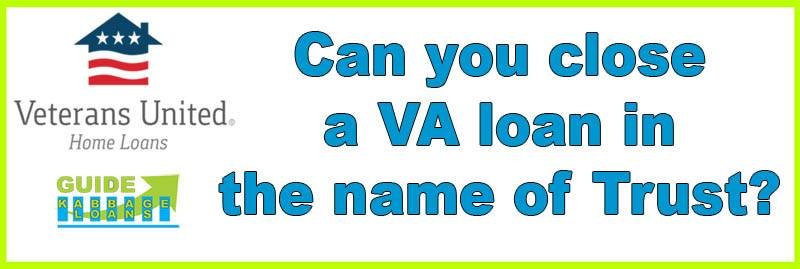If you are a veteran or a service member, you may be eligible for a VA loan to buy or refinance a home or Land. However, if you have a trust and want to close a VA loan in it, you may be wondering if it’s possible. In this article, we will tell you how to close a VA loan in a trust, what the requirements are for this, and what steps will have to be taken, we will discuss all the aspects in detail.
What is a VA loan?
A VA loan is a mortgage loan program that is backed by the Department of Veterans Affairs (VA). It is designed to help veterans, active-duty service members, and their eligible surviving spouses buy, build, or improve a home. VA loans offer several advantages over conventional loans, including no down payment, no private mortgage insurance (PMI) requirement, and lower interest rates.
What is a trust?
A trust is a legal arrangement that allows you to ensure your assets are managed and distributed according to your specific wishes, both during your lifetime and after your death. It involves three main parties: the grantor, who creates the trust and transfers assets into it; the trustee, who manages the assets according to the terms set out by the grantor; and the beneficiaries, who receive the benefits from the trust.
One of the primary advantages of a trust is that it provides clear instructions on how and when your assets should be used and distributed. For example, you can specify that certain assets should be used for a beneficiary’s education or released to them at a certain age. This can be particularly useful in ensuring that your assets are used in a manner that aligns with your values and intentions.
In the USA, some well-known types of trusts include:
- Revocable Living Trust: Allows you to retain control of your assets while you are alive and provides for their distribution upon your death without the need for probate.
- Irrevocable Trust: Once established, this trust cannot be altered or revoked. It can provide significant tax benefits and protection from creditors.
- Testamentary Trust: Created through your will and takes effect upon your death. It is often used to manage estate assets according to your wishes.
- Charitable Remainder Trust: Allows you to donate assets to a charity, receiving income from the assets during your lifetime and leaving the remainder to the charity.
(( Reference: US bank website))
Can you close a VA loan in a trust?
Yes, you can close a VA loan in a trust, specifically a revocable living trust, but it requires the approval of your lender. When you put your VA mortgage into a revocable living trust, you continue to make payments as usual. The main benefit of doing this is that, in the event of your death or if you become incapacitated, the property is automatically transferred to your successor trustee. This arrangement can simplify the process for your beneficiaries and help avoid the probate process.
To do this, you would need to ensure that the lender agrees to the transfer of the property into the trust. Once the lender approves, the title of the property can be changed to reflect the trust as the owner. It’s important to note that while you are alive and capable, you maintain control over the property and the mortgage terms remain the same.
How to Close a VA Loan in a Trust: A Step-by-Step Guide.

Closing a VA loan in a trust can be a complex process, but it can be done with the help of an experienced loan officer and attorney. Here is a step-by-step guide on how to close a VA loan in a trust:
Step 1: Consult with a loan officer
Before you start the process, you should consult with a loan officer who is experienced in closing VA loans in trusts. They can help you understand the requirements and provide you with guidance on the process.
Step 2: Create a revocable trust
If you don’t already have a revocable trust, you will need to create one. You should work with an attorney who is experienced in estate planning to create a trust that meets the VA’s requirements.
Step 3: Obtain a VA loan preapproval
You will need to obtain a VA loan preapproval before you can start the process of closing a VA loan in a trust. This involves submitting your financial information to a lender who will evaluate your eligibility for a VA loan.
Step 4: Provide documentation
You will need to provide documentation to the lender and the VA that shows that the trust meets the requirements. This may include a copy of the trust agreement, a statement from the trustee, and other documents.
Step 5: Close the loan
Once all of the documentation has been provided and reviewed, you can close the loan. The loan will be funded and the property will be transferred to the trust.
What is the process for closing a VA loan in a trust?
The process for closing a VA loan in a trust is similar to the process for closing a VA loan in your own name. However, there are some additional steps and requirements that you will need to meet. Here are the general steps involved:
- Determine eligibility: First, you must determine if you are eligible for a VA loan. This involves meeting the service requirements and obtaining a Certificate of Eligibility (COE).
- Obtain a VA loan preapproval: Once you have determined your eligibility, you will need to obtain a pre-approval for a VA loan. This involves submitting your financial information to a lender who will evaluate your creditworthiness and determine the maximum loan amount you qualify for.
- Create a revocable trust: If you don’t already have a revocable trust, you will need to create one. This involves working with an attorney who is experienced in estate planning to create a trust that meets the VA’s requirements.
- Provide documentation: You will need to provide documentation to the lender and the VA that shows that the trust meets the requirements. This may include a copy of the trust agreement, a statement from the trustee, and other documents.
- Appraisal and inspection: The property you are purchasing or refinancing will need to be appraised and inspected to ensure it meets VA standards. The appraisal determines the value of the property and the inspection looks for any potential issues with the property.
- Final approval: Once the appraisal and inspection are complete, the lender will review all the documentation and make a final decision on whether to approve the loan.
- Closing: If the loan is approved, you will go through a closing process, which involves signing all the necessary paperwork and paying any closing costs. If the loan is being closed in a trust, the property will be transferred to the trust.
Can a VA loan be vested in a trust?
Yes, a VA loan can be vested in a trust, as long as the trust meets the VA’s requirements. The trust must be revocable, and the veteran or service member must be the primary beneficiary of the trust. The trustee must also sign a document agreeing to comply with the VA loan requirements.
Can a VA loan be refinanced while in a trust?

Yes, a VA loan can be refinanced while it is in a trust. However, the process may be more complicated than refinancing a VA loan that is not in a trust. You will need to work with an experienced loan officer and attorney to ensure that the trust meets the requirements and that the refinancing process is completed correctly. Because the second VA loan rules are different in both conditions.
Steps to refinance VA loan in a trust:
- Trustor’s Consent: The trustor must agree to the refinance.
- Trust Documentation: The lender will review trust documents to ensure the trustee has the authority to refinance.
- Lender Approval: Find a lender experienced with trust properties.
- Title Transfer: The property may need to be temporarily transferred out of the trust and then back into it post-refinance.
- VA Loan Requirements: The borrower must meet VA eligibility, including a valid Certificate of Eligibility (COE).
- Appraisal and Credit Check: The property must be appraised and the borrower’s credit checked.
Conclusion.
It is possible to close a VA loan in a trust, but it requires additional steps and documentation. If you are considering closing a VA loan in a trust, it is important to work with an experienced loan officer and attorney to ensure that you meet all the requirements and complete the process correctly. By following the steps outlined in this article, you can successfully close a VA loan in trust and enjoy the benefits of homeownership as a veteran or service member.
Faq’s
Can you close a va loan in the name of a trust?
Yes you can close a va loan in the name of a trust but this process have some terms and conditions which you have to know.you read them in our previous paragraph.
Can you close a VA loan in a trust?
Yes, it is possible to close a VA loan in a trust.
What are the advantages of closing a VA loan in a trust?
One advantage of closing a VA loan in a trust is that it can help to protect the property from certain legal issues, such as probate or lawsuits.
Can a non-veteran be a trustee for a VA loan in a trust?
Yes, a non-veteran can be a trustee for a VA loan in a trust, but they must be a family member or business partner of the veteran.
What happens to a VA loan if the trust is dissolved or terminated?
If the trust is dissolved or terminated, the VA loan will continue to be valid as long as the borrower remains eligible and continues to make payments.
Can a va mortgage close in a trust?
Yes, va mortgage Can be close in a trust. But you must be eligible for that. You will have to show all the documents related to it only after that you will be able to do so. We have given more information about this in our article, if you read our article completely then you will understand everything.
Thanks for your visit.
(Can You Close a VA Loan in a Trust?)
Disclaimer: This article is for informational purposes only and does not constitute legal advice. Consult with a qualified professional before making any decisions regarding VA loans or trusts. Before taking any decision, read the external sources carefully.





